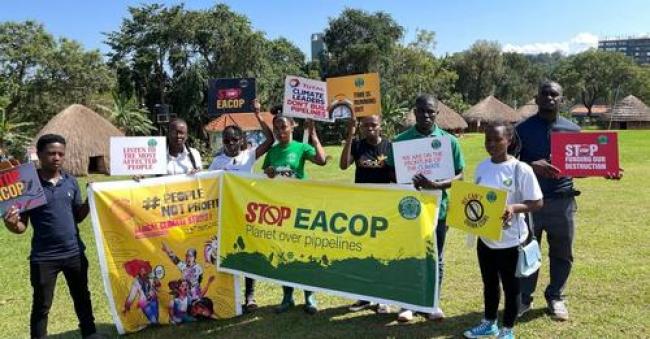Articles Menu

Sept. 23, 2022
Thousands of African activists and members of communities on the frontlines of the worsening climate emergency turned out Friday to call on world leaders—who will gather in Egypt in November for the United Nations Climate Summit—to urgently address a crisis that disproportionately impacts their lives.
"The least responsible nations and communities are suffering the most from the impacts of the climate emergency."
Demonstrators took to the streets, public spaces, and even waterways in countries across a continent that's responsible for just 4% of global greenhouse emissions to demand climate justice and an end to fossil fuel exploration and extraction ahead of the U.N.'s COP27 conference, scheduled to start November 6 in Sharm El-Sheikh.
Activists expressed solidarity with global climate strikes—including the youth-led Fridays for Future movement—demanding justice and reparations for the people most affected by a crisis they did the least to cause. Some demonstrations called out individual contributors to the climate emergency, such as the Total-led East African Crude Oil Pipeline.
The protests took place as many parts of Africa are experiencing the worst food crisis in decades. Climate-driven drought and desertification have pushed tens of millions of people to the brink of famine, while shortages and soaring prices of food—fueled by climate change, Russia's invasion of Ukraine, and capitalist predation—adversely affect many millions more.
"The urgency of the climate crisis cannot be understated, particularly here in Africa, which is the region most vulnerable to climate impacts. It is thus concerning that instead of funding a much-needed just transition in Africa, nations in the European Union are turning their gaze to Africa to meet their gas needs," 350Africa.org regional director Landry Ninteretse said in a statement.
"Rather than lock our continent into production of fossils, developed nations should be held accountable for their role in the climate crisis," Ninteretse added. "Ahead of COP27, our expectations are that they should provide compensation in the form of loss and damage suffered by the developing nations as a result of climate impacts, support adaptation measures to allow us to build resilience to these impacts, and inject funding into the just transition to renewable energy in Africa."
Earlier this week, Denmark became the first country to promise to establish a loss and damage fund that aims to compensate developing nations for the destruction caused by climate change.
Edmund Mumbere, a Ugandan activist, said that "as the communities on the frontlines of the climate crisis, we have to hold governments, corporations, financial institutions, and policymakers to account for the harmful practices that are devastating our communities."
"This is why we have been resisting fossil fuel projects, which should not have a place in the future of our continent, or the world," he added. "As climate impacts are projected to worsen, as seen with the recent severe flooding in Uganda, there's a great need for financing to be redirected into renewable energy to support a just transition in Africa."
Friday's protests took place three days before hundreds of young climate activists from across the Global South are set to kick off a weeklong Climate Justice Camp in Tunisia.
"The least responsible nations and communities are suffering the most from the impacts of the climate emergency, which is further deepening historical injustices," Greenpeace Middle East and North Africa regional campaigns manager Ahmed El Droubi said in a statement.
"In November, world leaders will be making decisions in Egypt, which will affect the future of our communities," he added. "We in the Global South need to be at the front of this process to apply pressure for real climate action rather than it being another photo opportunity producing empty words and pledges."